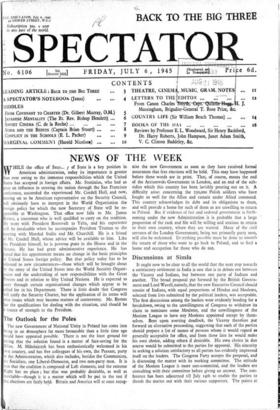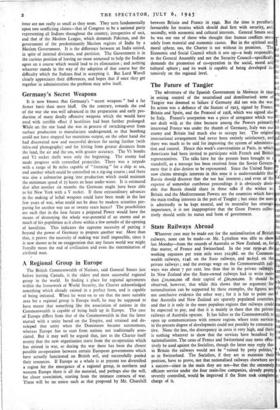Discussions at Simla
It ought now to be clear to all the world that the next step towards a satisfactory settlement in India is one that is in debate not between the Viceroy and Indians, but between one party of Indians and another. The broad proposal put forward by the British Govern- ment and Lord Wavell, namely, that the new Executive Council should consist of Indians, with equal proportions of Hindus and Moslems, selected from lists submitted by the political leaders, was acceptable. The first discussions among the leaders were evidently heading for a breakdown, owing to the unwillingness of Congress to withdraw its claim to nominate some Moslems, and the unwillingness of the Moslem League to have any Moslems appointed except by them- selves. Bent upon averting deadlock, the Viceroy therefore put forward an alternative proceeding, suggesting that each of the parties should prepare a list of names of persons whom it would regard as generally acceptable for office, and from these lists he would make his own choice, adding others if desirable. His own choice in due course would be submitted to the parties for approval. His sincerity in seeking a solution satisfactory to all parties has evidently impressed itself on the leaders. The Congress Party accepts the proposal, and is discussing the matter with its working committee. The attitude of the Moslem League is more non-committal, and the leaders are consulting with their committee before giving an answer. The con- ference has been adjourned till July r4th to enable the parties to thrash the matter out with their various supporters. The points at
issue are not really as small as they seem. They turn fundamentally upon two conflicting claims—that of Congress to be a national party representing all Indians throughout the country, irrespective of sect, and that of the Moslem League, which demands Pakistan, and the government of the predominantly Moslem regions of India by a Moslem Government. It is the difference between an India united, in spite of internal divisions, and partition. The Government is in the curious position of leaving no stone unturned to help the Indians agree on a course which would lead to its elimination ; and nothing whatever stands in the way of the adoption of that course but the difficulty which the Indians find in accepting it. But Lord Wavell clearly appreciates their differences, and hopes that if once they get together in administration the problem may solve itself.





























 Previous page
Previous page